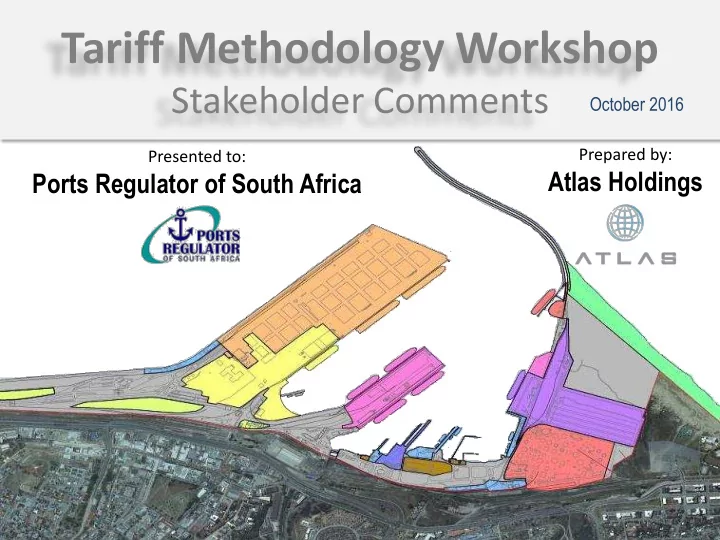

Tariff Methodology Workshop Stakeholder Comments October 2016 Prepared by: Presented to: Atlas Holdings Ports Regulator of South Africa
NPA Function NPA Function The main function of the Authority is to: own, manage, control and administer ports to ensure their efficient and economic functioning. NPA is therefore primarily an infrastructure provider and oversight authority. It may also perform other functions as may be necessary in order to achieve the objectives of the Ports Act
Required Revenue Model Required Revenue (RR) Model deemed rational to provide revenue security Risks are mitigated through revenue allowance and clawback mechanism Enables competitive financing Ensures asset replenishment, development & maintenance
Role of Regulator, PCC’s and Port Users If the RR Model is assumed, the roles of the Regulator, PCC’s and Port Users are crucial to: Assist NPA to ensure that asset development is reflective of demand. Continue to interrogate the model to ensure resultant tariffs: Promote equitable accessibility to national port infrastructure Do not inhibit port users’ ability to trade competitively
Efficiencies & Incentives using RR Model There remains a concerns that the RR Model: Does not incentivise the NPA Does not promote efficiency Consider linking certain Revenue Allocations to Targets i.e. Budgeted Operating Costs VS Actual Operating Costs Once the budgeted target is approved: Cost efficiencies achieved could be enjoyed by NPA Cost overruns could similarly be borne by the Authority
Regulatory Asset Base We await outcome of the revaluation of the RAB by the Regulator However, we note the following: Prior to the current Tariff Manual, NPA had proposed recording its assets in the RAB at “fair value” Our view is that the RR Model is intended to recover the “True Cost” of the assets and provide a reasonable return thereon. We therefore support recording the assets at their depreciated cost for RAB purposes.
Excessive Tariff Increase Margin Credit (ETIMC) Regulator to consider Pro-rating the ETIMC in line with projected capital investment Revised annually to account for changes in carrying balance (utilisation, interest earned, clawback additions) as well as updated CAPEX programme(s) In Addition Consider utilising a portion of ETIMC to expedite Pricing Strategy. Any increase for a CHT paying above it’s port asset utilisation could be considered an “Excessive Tariff Increase”
Beneficiation Promotion Programme (BPP) NPA and Regulator both agree with the principle of supporting Beneficiated Exports, however: Implementation has been delayed due to the DTI process required to identify value-addition per product per sector This should be motivated as a Top Priority Logistics costs (including port charges) remain prohibitively high for local manufacturers BUT There needs to be an agreed methodology to ensure that the resultant revenue shortfall is not simply recovered from import equivalents within the same Cargo Handling Type.
Funding from the Fiscus Regulator should consider motivating for port funding directly from the Fiscus Global comparator ports are, in part, Government funded Port Costs for particular CHTs (Automotive being one) remain uncompetitive globally, even at the Pricing Strategy’s deemed “end - state” A direct fiscus allocation could be ring-fenced to support Beneficiated Exports i.t.o. BPP As such, BPP would not need to be funded by other Port Users already facing prohibitively high port costs.
Single Transport Economic Regulator(BPP) We are supportive of the proposed Single Transport Economic Regulator (STER) In our view, the Authority is currently unable to fully execute its mandate in terms of Ports Act, regarding port terminal operations and pricing There remains a lack of competition (or regulation) for some tenants of key national infrastructure We believe that Terminal Operators, for every Cargo Handling Type (CHT), should be subject to: Private Sector Competition; or Regulation STER will provide the required regulatory oversight
Ground Floor Block H, P.O. Box 786864 Tel: + 27 11 581 9200 Wedgewood Office Park, Sandton Fax: +27 86 693 0800 3 Muswell Road, 2060 Email: info@atlas.za.com Bryanston
Recommend
More recommend